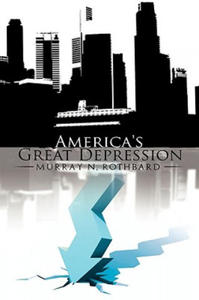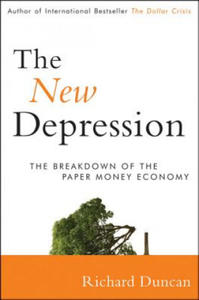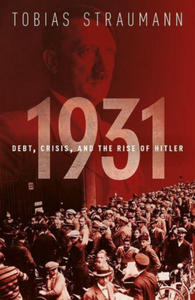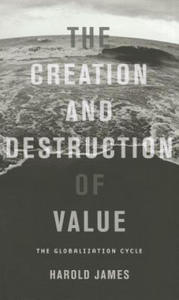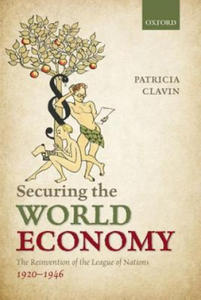libristo monetary policy and the onset of the great depression 2096186
- znaleziono 8 produktów w 2 sklepach
Roosevelt's Monetary Policy - The International Political Economy During The Great Depression & World War II
Książki Obcojęzyczne>Angielskie>The arts>History of art / art & design styles
0x001f775900000000
Sklep: Gigant.pl
America's Great Depression www.bnpublishing.com
Książki / Literatura obcojęzyczna
Rothbard opens with a theoretical treatment of business cycle theory, showing how an expansive monetary policy generates imbalances between investment and consumption. He proceeds to examine the Fed's policies of the 1920s, demonstrating that it was quite inflationary even if the effects did not show up in the price of goods and services. He showed that the stock market correction was merely one symptom of the investment boom that led inevitably to a bust. The Great Depression was not a crisis for capitalism but merely an example of the downturn part of the business cycle, which in turn was generated by government intervention in the economy. Had the book appeared in the 1940s, it might have spared the world much grief. Even so, its appearance in 1963 meant that free-market advocates had their first full-scale treatment of this crucial subject. The damage to the intellectual world inflicted by Keynesian- and socialist-style treatments would be limited from that day forward.
Sklep: Libristo.pl
America's Great Depression www.bnpublishing.com
Książki / Literatura obcojęzyczna
Rothbard opens with a theoretical treatment of business cycle theory, showing how an expansive monetary policy generates imbalances between investment and consumption. He proceeds to examine the Fed's policies of the 1920s, demonstrating that it was quite inflationary even if the effects did not show up in the price of goods and services. He showed that the stock market correction was merely one symptom of the investment boom that led inevitably to a bust. The Great Depression was not a crisis for capitalism but merely an example of the downturn part of the business cycle, which in turn was generated by government intervention in the economy. Had the book appeared in the 1940s, it might have spared the world much grief. Even so, its appearance in 1963 meant that free-market advocates had their first full-scale treatment of this crucial subject. The damage to the intellectual world inflicted by Keynesian- and socialist-style treatments would be limited from that day forward. About the Author Murray N. Rothbard, the author of 25 books and thousands of articles, was a historian, philosopher, and dean of the Austrian School of economics. The S.J. Hall Distinguished Professor of Economics at the University of Nevada, Las Vegas, he was also Academic Vice President of the Ludwig von Mises Institute in Auburn, Ala.
Sklep: Libristo.pl
Monetary History of the United States, 1867-1960 Princeton University Press
Książki / Literatura obcojęzyczna
Writing in the June 1965 issue of the "Economic Journal", Harry G. Johnson begins with a sentence seemingly calibrated to the scale of the book he set himself to review: 'The long-awaited "Monetary History of the United States" by Friedman and Schwartz is in every sense of the term a monumental scholarly achievement - monumental in its sheer bulk, monumental in the definitiveness of its treatment of innumerable issues, large and small ...monumental, above all, in the theoretical and statistical effort and ingenuity that have been brought to bear on the solution of complex and subtle economic issues'.Friedman and Schwartz marshaled massive historical data and sharp analytics to support the claim that monetary policy - steady control of the money supply - matters profoundly in the management of the nation's economy, especially in navigating serious economic fluctuations. In their influential chapter 7, "The Great Contraction" - which Princeton published in 1965 as a separate paperback - they address the central economic event of the century, the Depression.According to Hugh Rockoff, writing in January 1965: 'If Great Depressions could be prevented through timely actions by the monetary authority (or by a monetary rule), as Friedman and Schwartz had contended, then the case for market economies was measurably stronger.' Milton Friedman won the Nobel Prize in Economics in 2000 for work related to "A Monetary History " as well as to his other Princeton University Press book, "A Theory of the Consumption Function" (1957).
Sklep: Libristo.pl
New Depression John Wiley & Sons Inc
Książki / Literatura obcojęzyczna
Why the global recession is in danger of becoming another Great Depression, and how we can stop it When the United States stopped backing dollars with gold in 1968, the nature of money changed. All previous constraints on money and credit creation were removed and a new economic paradigm took shape. Economic growth ceased to be driven by capital accumulation and investment as it had been since before the Industrial Revolution. Instead, credit creation and consumption began to drive the economic dynamic. In The New Depression: The Breakdown of the Paper Money Economy , Richard Duncan introduces an analytical framework, The Quantity Theory of Credit, that explains all aspects of the calamity now unfolding: its causes, the rationale for the government's policy response to the crisis, what is likely to happen next, and how those developments will affect asset prices and investment portfolios. In his previous book, The Dollar Crisis (2003), Duncan explained why a severe global economic crisis was inevitable given the flaws in the post-Bretton Woods international monetary system, and now he's back to explain what's next.The economic system that emerged following the abandonment of sound money requires credit growth to survive. Yet the private sector can bear no additional debt and the government's creditworthiness is deteriorating rapidly. Should total credit begin to contract significantly, this New Depression will become a New Great Depression, with disastrous economic and geopolitical consequences. That outcome is not inevitable, and this book describes what must be done to prevent it. Presents a fascinating look inside the financial crisis and how the New Depression is poised to become a New Great Depression Introduces a new theoretical construct, The Quantity Theory of Credit, that is the key to understanding not only the developments that led to the crisis, but also to understanding how events will play out in the years ahead Offers unique insights from the man who predicted the global economic breakdown Alarming but essential reading, The New Depression explains why the global economy is teetering on the brink of falling into a deep and protracted depression, and how we can restore stability.
Sklep: Libristo.pl
Straumann,Tobias (Associate Professor of Economic History,University of Zurich) - 1931 Oxford University Press
Książki / Literatura obcojęzyczna
Germany's financial collapse in the summer of 1931 was one of the biggest economic catastrophes of modern history. It led to a global panic, brought down the international monetary system, and turned a worldwide recession into a prolonged depression. The crisis also contributed decisively to the rise of Hitler. Within little more than a year of its onset, the Nazis were Germany's largest political party at both the regional and national level, paving the way for Hitler's eventual seizure of power in January 1933. The origins of the collapse lay in Germany's large pile of foreign debt denominated in gold-backed currencies, which condemned the German government to cut spending, raise taxes, and lower wages in the middle of a worldwide recession. As political resistance to this policy of austerity grew, the German government began to question its debt obligations, prompting foreign investors to panic and sell their German assets. The resulting currency crisis led to the failure of the already weakened banking system and a partial sovereign default. Hitler managed to profit from the crisis because he had been the most vocal critic of the reparation regime responsible for the lion's share of German debts. As the financial system collapsed, his relentless attacks against foreign creditors and the alleged complicity of the German government resonated more than ever with the electorate. The ruling parties that were responsible for the situation lost their credibility and became defenceless in the face of his onslaught against an establishment allegedly selling the country out to her foreign creditors. Meanwhile, these creditors hesitated too long to take the wind out of Hitler's sails by offering debt relief. In this way, a financial crisis soon developed into a political catastrophe for both Europe and the world.
Sklep: Libristo.pl
Creation and Destruction of Value Harvard University Press
Książki / Literatura obcojęzyczna
Harold James examines the vulnerability and fragility of processes of globalization, both historically and in the present. This book applies lessons from past breakdowns of globalization - above all in the Great Depression - to show how financial crises provoke backlashes against global integration: against the mobility of capital or goods, but also against flows of migration. By a parallel examination of the financial panics of 1929 and 1931 as well as that of 2008, he shows how banking and monetary collapses suddenly and radically alter the rules of engagement for every other type of economic activity. Increased calls for state action in countercyclical fiscal policy bring demands for trade protection. In the open economy of the twenty-first century, such calls are only viable in very large states - probably only in the United States and China. By contrast, in smaller countries demand trickles out of the national container, creating jobs in other countries. The international community is thus paralyzed, and international institutions are challenged by conflicts of interest.The book shows the looming psychological and material consequences of an interconnected world for people and the institutions they create.
Sklep: Libristo.pl
Securing the World Economy Oxford University Press
Książki / Literatura obcojęzyczna
Securing the World Economy explains how efforts to support global capitalism became a core objective of the League of Nations. Based on new research drawn together from archives on three continents, it explores how the world's first ever inter-governmental organization sought to understand and shape the powerful forces that influenced the global economy, and the prospects for peace. It traces how the League was drawn into economics and finance by the exigencies of the slump and hyperinflation after the First World War, when it provided essential financial support to Austria, Hungary, Greece, Bulgaria, and Estonia and, thereby, established the founding principles of financial intervention, international oversight, and the twentieth-century notion of international 'development'. But it is the impact of the Great Depression after 1929 that lies at the heart of this history. Patricia Clavin traces how the League of Nations sought to combat economic nationalism and promote economic and monetary co-operation in a variety of, sometimes contradictory, ways.Many of the economists, bureaucrats, and policy-advisors who worked for it played a seminal role in the history of international relations and social science, and their efforts did not end with the outbreak of the Second World War. In 1940 the League established an economic mission in the United States, where it contributed to the creation of organizations for the post-war world - the United Nations Organization, the IMF, the World Bank, the UN Food and Agriculture Organization - as well as to plans for European reconstruction and co-operation. It is a history that resonates deeply with challenges that face the Twenty-First Century world.
Sklep: Libristo.pl
Sklepy zlokalizowane w miastach: Warszawa, Kraków, Łódź, Wrocław, Poznań, Gdańsk, Szczecin, Bydgoszcz, Lublin, Katowice
Szukaj w sklepach lub całym serwisie
1. Sklepy z libristo pl monetary policy and the onset of the great depression 2096186
2. Szukaj na wszystkich stronach serwisu
t1=0.027, t2=0, t3=0, t4=0, t=0.027


